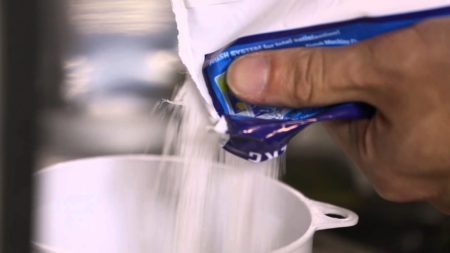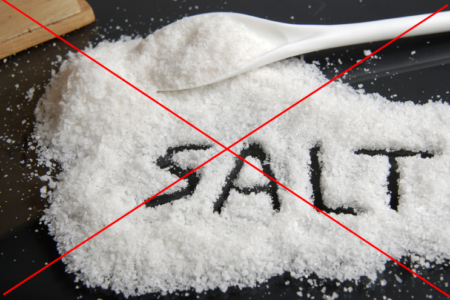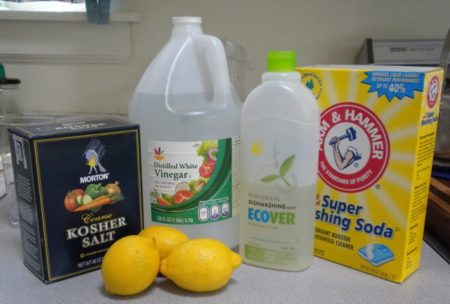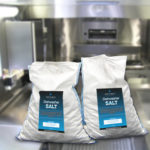The economy must be economical! So once said Brezhnev and many housewives completely agree with him, and especially agree at a time when there is no extra money available and the salt in the dishwasher is over. And they have a completely logical idea: how to replace the salt for the dishwasher? If it's just salt, then why pay a lot of money for it?
Let's look at this issue together and consider all the options. Since, the fact that this is salt does not mean at all that this salt is a dining room and is completely identical.
![]() See also - Basic rules for using a dishwasher
See also - Basic rules for using a dishwasher
What is the function of salt in the dishwasher?
Salt is not just a necessary component when washing dishes, but can be said to be indispensable. Without its presence, washing will not succeed!
The main purpose of salt is to soften water. Because, in hard water, the detergent will not give foam, but simply dissolve and not clean the pollution. And the water in our taps is hard, and you can’t get anywhere from this fact.
And, due to the fact that salt makes the water soft, it turns out another, side, but not unimportant bonus: no scale is formed on the iron parts of the machine. And, therefore, the machine will not fail for this reason.
Many will probably say now: I'm sorry, what nonsense? How can salt soften water if everyone knows that, on the contrary, it makes it hard? It turns out that salt for the machine is called soda? Indeed, only alkali can soften water!
To this we will answer: no soda! Namely - salt, ordinary sodium chlorine. And it softens the water - in a completely indirect way, simply feeding the ion exchanger resin with its charge.
An ion exchanger is a tank filled with resin balls that, like a sponge, absorb magnesium and calcium ions from the running water passing through it. Thus, purifying the water and making it soft and suitable for effective washing. But, these balls will not work like a sponge, if they are not saturated with saline, it makes up for the loss of ions.
In general, the resin is negatively charged, while calcium and sodium are positively charged. And if the resin is discharged, then it will not be able to attract anything and washing will be ineffective, since soap in hard water, and even in such a minimal amount, is unable to dissolve. These are miracles ...
![]() See also - Where and why to pour salt in the dishwasher
See also - Where and why to pour salt in the dishwasher
How is special salt different from ordinary?
 We think that you yourself understand that the word “horse” may not always indicate an Arabian horse, but may mean that it is an ordinary pony.And then try to prove at the races that horses are also ponies!
We think that you yourself understand that the word “horse” may not always indicate an Arabian horse, but may mean that it is an ordinary pony.And then try to prove at the races that horses are also ponies!
It's the same story with salt. Special salt for dishwashers has two differences from ordinary:
- The deepest cleaning of impurities
- Granulation is not so small
And these two factors make it a completely different product, although it remains in composition the usual sodium chlorine.
In ordinary salt contains a lot of impurities, up to the fact that there are particles of sand and gypsum. These things completely confuse the ion exchanger, disabling it, and, in addition, spoil the iron parts, contributing to the very scale that the ion exchanger is designed to fight.
Granulation of this salt is designed so that it slowly dissolves and in no case clog the ion exchanger filter. That is, if you pour fine salt, it clogs the filter and it will not work at all! Naturally, there will be absolutely no effect, since the saline solution will not reach its destination. After all, as you remember, salt plays only an indirect role and it does not directly get to the plates.
What categorically can not replace a special salt?
 So, what cannot be replaced?
So, what cannot be replaced?
Coarse salt, but dirty - definitely cannot be used.
Salt of pure, but too fine fraction "Extra" - also cannot be used, as it will clog the filter of the ion exchanger.
Maybe sea salt? No, you can't either. Since, sea salt is even less purified than the usual dining room, gray. In sea salt, an incredible amount of iodine and other minerals are very useful to the human body, but not to the iron parts of the technique.
Soda - even more so! In general, put this idea out of your head, since they are completely different things. And the fact that soda softens water has nothing to do with the ion exchanger. Which will surely fail from such experiments.
And replacing an ion exchanger is an expensive and not economical thing. Imagine how many years you could buy a special salt, instead of replacing the ion exchanger? The same.
What can be replaced without prejudice to technology?
 There are only two options. Or, put the filter on the tap where the water comes from, or, replace the salt for the dishwasher with the salt for the pools.
There are only two options. Or, put the filter on the tap where the water comes from, or, replace the salt for the dishwasher with the salt for the pools.
It is such a special salt, tableted and highly purified. It is sold in 25 kg bags and costs much less than a special one.
But, these alternatives also have their drawbacks.
If nothing is poured into the salt compartment, the ion exchanger will fail. And changing a clogged filter is also not so cheap and dreary. And if, one fine day, your filter is completely clogged and water starts to slip, and there is no suitable replacement, then this is very bad, since the ion exchanger is no longer working! And it turns out that the sink will have to be canceled indefinitely.
And tableted salt has the disadvantage that it is not sold at every step. This time. Secondly, it fits much less into the tank than a special one. And this is too much fuss about filling.
But in the end, we still reassure you a little. If, suddenly, it happened that there is catastrophically no money in the house, but you need to wash it, then pour in ordinary, gray salt! Just fill the tank a little. Literally, for a couple of washes, until you have the opportunity to purchase a special one.
There won't be any significant changes in a short period of time, don't worry.
So, dear hostesses, now you know how to replace the salt for the dishwasher. We hope that you will take into account our recommendations and will not harm your irreplaceable assistant!

